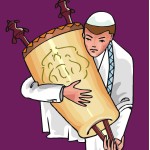 These are laws related to teaching Jewish children Torah. It is taken from the book, “Halachos of educating children” by Rabbi Neuwirth.
These are laws related to teaching Jewish children Torah. It is taken from the book, “Halachos of educating children” by Rabbi Neuwirth.
“Halachoth of Educating Children” by Rabbi Neuwirth
6. The Torah has mandated that the father personally teach his son Torah, as it is written, “Teach them to your children” (Devarim 11:19). If he cannot teach him himself, the father must look after his son’s education by hiring a teacher for him if necessary.
7. The mitzah to teach one’s son Torah and to hire a teacher to do so, applies to a son’s son as well. Some extend the obligation also to one’s daugther’s son.
8. The mitzvah of Torah study is a daily one; pupil’s learning must not be interupted at all, except at the end of the day, on the eve of the Sabbath and festivals, and on festivals themselves. It is a mitzvah to teach them all day and a little into the night, so as to train them to learn by day and night, as it is stated: “You shall meditate therein day and night” (Yehoshua 1:8).
11. Mothers earn their World to Come by bringing their children to their teacher to learn Torah (Berachos 17a; Sotah 21a).
12. When does one begin teaching his son? When the child begins to speak, his father should teach him “Moshe commanded us the Torah” (Devarim 33:4) and “Hear, O Israel” (ibid. 6:4). He slowly continues to add verses commensurate to the child’s comprehension (Rambam).
13. As soon as a child turns three years old, he is taught the alphabet.
14. At five years of age, the child begins learning Scripture, proceeding from “In the beginning” (Bereshis 11:1) through “before the eyes of all Israel” (Devarim 34:12). This is followed by all the other books of the Bible. At the age of ten, he studies the Mishnah.
15. It is customary to begin the child’s education with the opening section of the book of Vayikra, which discusses the sacrifices. As our Sages said, “May the pure ones (i.e. pupils learning Torah) come to study matters concerning purity.”
16. One may not change or condense the books of the Bible for the education of children.
17. The study of Torah serves as both an objective and as means to an end. The objective is the learning of Torah for its own sake and knowledge, while it also serves as the means by which the student learns how to observe the mitzvos.
Women are obligated only to study in order to fulfill the mitzvos. A father is obligated to teach his daughter the laws of those mitzvos that pertain to her, for how could she observe the Sabbath, for e.g., without knowing its laws?
Thus, women too recite the daily blessings for the study of Torah, as this applies to what they are required to learn. It is told about Rabbi Yosef Chaim Sonnenfeld, o.b.m., that he kept a daily half-hour study session in Orach Chaim with his wife.
18. There is another type of learning, that which leads one to the fear of Heaven. To attain that, one must fix a time for the study of the books of the Tanach and the words of our Sages, all of which are built upon the foundation of the fear of Heaven. It is well known that, on his way to Eretz Yisrael, the Gaon of Vina wrote to his mother and his wife that they should regularly read the books of mussar (ethics and morality) he left behind, and that they should be the only things that they occupy themselves with on the Sabbath. It is also said of the Chasam Sofer, o.b.m., that he personally studied the tales of our Sages with his daughters. One ought to keep in mind that the objective lies not merely in the reading of such material, but in the taking of it to one’s heart and becoming emotionally affected by it.
19. On Passover eve, it is incumbent upon every father to tell his sons and daughters about the Exodus from Egypt (or the laws pertaining to that night), for it is a cornerstone of our holy Torah and faith. The Torah commands us four times regarding this (Shemos 12:26, 13:8 and 14; Devarim 6:20), to include all the various types of sons, i.e. that we instruct each in the method most appropriate to him. On Passaover eve, one does things differently, in order that the children ask “Why is this night different”, and the other questions (brought in the Hagadah), so that we may instruct them through questions and answers and educate them in the way of Torah and faith. We involve all the children in reciting the Haggadah and performing the Seder.

